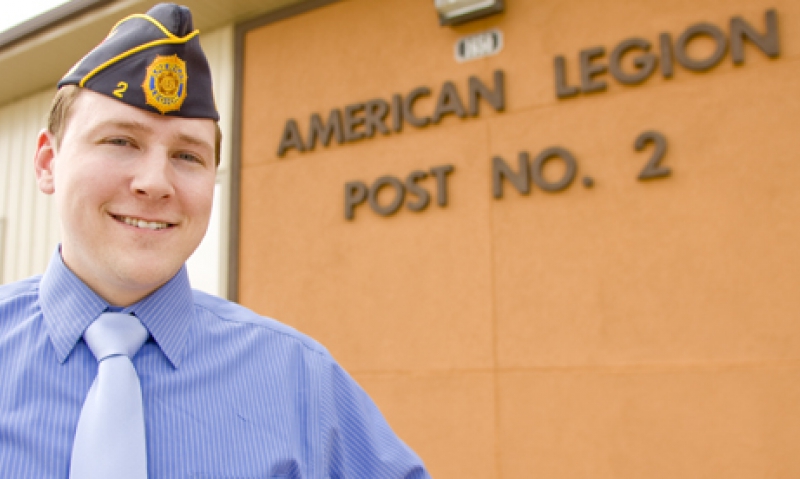
Only 27 and serving as commander of the second largest post in Wyoming, Loren Davis says a kinship exists between he and the older veterans in his post.
At George W. Vroman Post 2 in Casper, Wyo., the 500-some members span generations. There are Legionnaires like Stan Lowe, a Merchant Marine who was stationed aboard Navy vessels during World War II, and Robert Leonard, a Bataan Death March survivor who is approaching 90 years old. There are even a few veterans fresh from the current conflicts in the Middle East, like Loren P. Davis - a 20-something Marine who was in the original invasion of Iraq.
But at Post 2 - Wyoming's second largest - age doesn't automatically equal authority. This sentiment was demonstrated two months ago, when the post was forced to elect a new commander after a tragic car accident claimed the life of the former commander. For a replacement, members at Post 2 installed Davis - a 27-year-old systems engineer whose military service ended only five years ago.
"If I'm not the youngest at the post, I am one of the youngest," Davis says.
Davis, formerly Post 2's first vice commander, now presides over a large and diverse community of veterans, some of whom are old enough to be his grandparents. Among them are men who fought on the islands of the Pacific and in wars waged long before he was born.
The majority of the members are older - probably even much older - than Davis. He admits that it can be jarring and even a little bit awkward being in charge of people who have decades on him and who were in wars fought much differently than his own. But he says there's a common bond everyone can easily relate upon: military service.
"All those who serve in the military, we all kind of have that kinship at the most basic level," Davis says. "It doesn't matter what generation we're coming from. We've all shared a similar experience in times of war and times of military service."
This concept confronted Davis early in his tenure. His first act as post commander was to preside over the funeral of the former commander, Kirby Sells, who died in April in a roll-over car accident on his way home from a VA facility.
"It was sort of bittersweet that my first act as commander was to preside over the funeral of the former commander," Davis says. "It was the first American Legion funeral that even some of the older members can remember having at the post."
Davis realized quickly that military service could be a common bond to unite generations. He's been familiar with a similar idea - "Once a Marine, always a Marine" - since he joined the armed forces in 2001. So, the challenge wasn't necessarily relating to the older Legionnaires; it was respecting longstanding traditions and customs.
"Leadership is leadership," he says. "(Past traditions) aren't something I want to come in and trample on. I don't want to come in and reinvent anything or anything like that. I am actually treading very lightly so that I don't offend anybody's sense of honor or integrity."
When it comes to its membership, uniting the old and the new is a bit of a foreign subject to Post 2. Davis is quick to admit that there are few members his age at the post, and that's something he'd like to change. Though he is realistic. He decided to join the Legion around eight years ago when he learned what the organization does for veterans and local communities.
But to engage other veterans his age, he says it might not be a matter of spreading word of the Legion's good deeds; it could just be that the modern veteran needs to digest war experiences on his or her own terms before joining a veterans organization.
"To be perfectly honest, it's difficult to get a lot of the younger guys involved," he says. "Right now, I think a lot of them want to be left alone for the most part to think about what they've gone through and spend time with their families. We understand what they're going through and we respect that. That's not something we want to force. When they feel ready to be a part of us, and if they want to, then we're here for them."
He says younger veterans might be looking for activities that involve the entire family.
"I think (to engage younger members) it's a matter of making a shift - a hard-line shift but also a natural progression of being more family oriented and focusing on the family aspect of the organization," says Davis, who married his wife, Hazel, in May of, 2009. "A lot of the World War II guys, the older guys who went off to war, they didn't have wives and children at the time they left. So they didn't have that dynamic of coming back and having to involve the women, the sons and the daughters. The national organization, I think if we can shift our base into being a more family-oriented organization, that is going to create an appeal to a lot of the guys coming back who have families. They want to have a family activity."
Certainly, Davis speaks from experience. For him, engaging and spending time around the older veterans has been an enriching experience, even though he is technically their commander.
"I respect the older members, and I draw off them a lot for their experience," Davis says. "They're people I look toward to gain my own knowledge base, and I really want to do right by them. They're the ones who have been around the longest. I'm trying to learn my own way while at the same time respecting the traditions of the past."
- Membership

